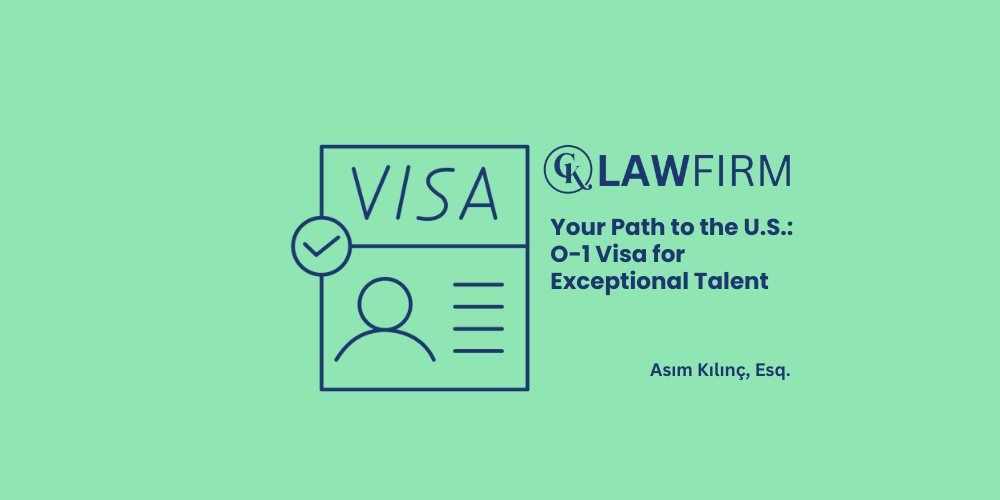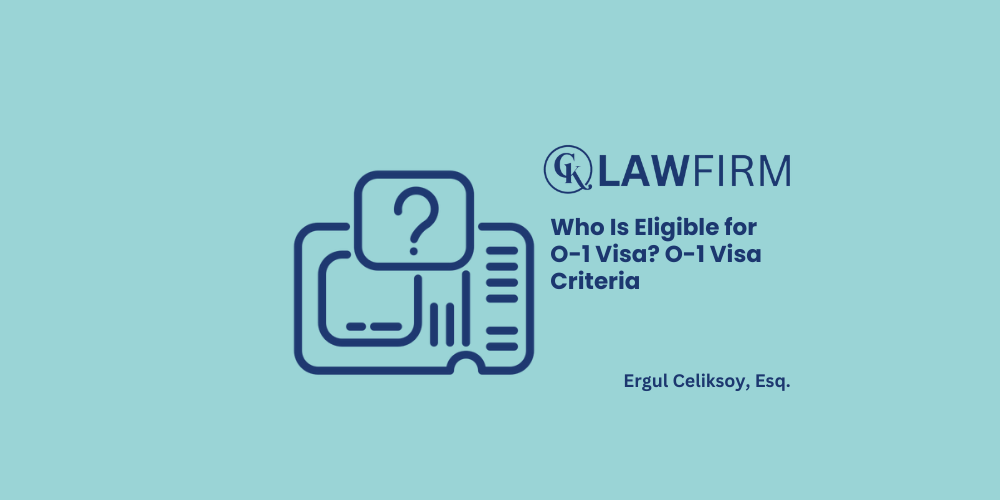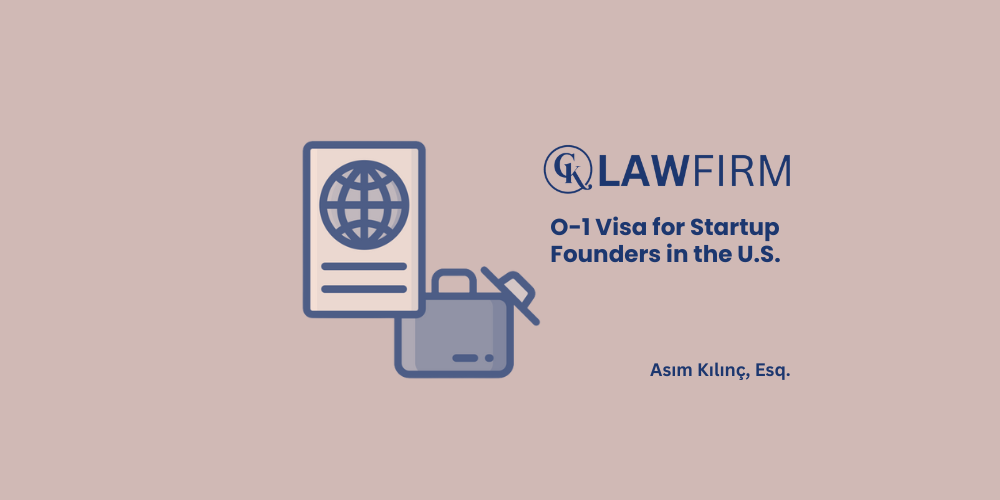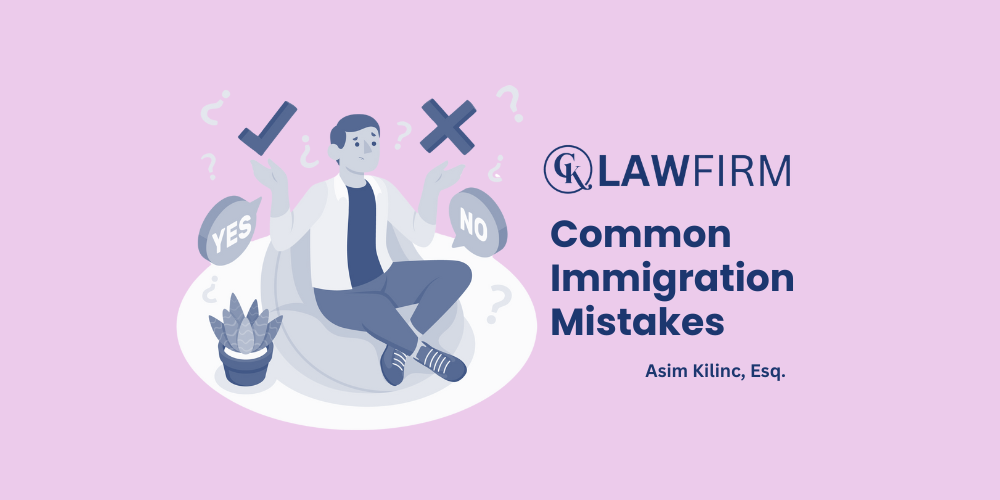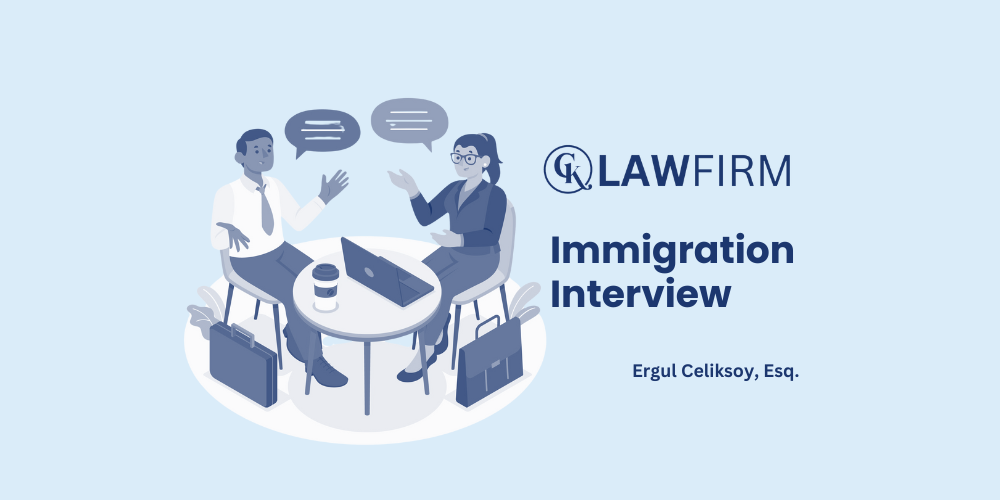Schedule an Appointment with Our Attorneys Now
Asım Kılınç, Immigration Attorney, CK Law Firm
O-1 Visa for Exceptional Talent offers a valuable opportunity for professionals with extraordinary abilities to build a career in the United States. Whether you are an academic making groundbreaking discoveries or an artist creating innovative works, applying for an O-1 Visa for Exceptional Talent can open the door to legally work and live in the U.S. In this blog, I’ll provide key insights into the O-1 Visa for Exceptional Talent application process, eligibility criteria, and required documentation.
Here’s a quick overview of the main topics covered:
- Understanding the O-1 Visa
- Eligibility Requirements for the O-1 Visa
- Who is Eligible for the O-1 Visa?
- Step-by-Step Guide to Applying for the O-1 Visa
I’ll explain these topics in detail to help you better understand the process. If you have additional questions or concerns, feel free to reach out. You can contact us through the comments section of this blog or via the CK Law Firm website Additionally, you’re welcome to connect with me directly on LinkedIn for further discussion. Enjoy your reading!
Understanding the O-1 Visa
The O-1 visa is designed for individuals who have demonstrated extraordinary abilities in fields such as science, arts, business, education, athletics, and entertainment. It allows qualified professionals to live and work in the United States under the sponsorship of a U.S. employer.
The O-1 visa is divided into two main categories based on the applicant’s field:
- O-1A Visa: Covers individuals with extraordinary abilities in science, education, business, and athletics.
- O-1B Visa: Designed for artists and professionals in the entertainment industry who have significant achievements.
Initially, the O-1 visa is granted for up to 3 years. After this period, it can be extended in 1-year increments as long as the applicant continues their professional activities in the U.S.
Eligibility Requirements for the O-1 Visa
According to USCIS (United States Citizenship and Immigration Services), applicants must meet at least three out of eight key criteria to qualify for the O-1 visa. These criteria assess the applicant’s extraordinary achievements and recognition on a national or international level:
- Receipt of a major national or international award of significant importance.
- Publication of groundbreaking work or studies in the respective field.
- Citations or references by prestigious organizations.
- Earning a high salary or remuneration compared to peers in the field.
- Holding a leading or critical role in a distinguished organization.
- Serving as a judge or member of a review panel evaluating the work of others.
- Membership in organizations that require outstanding achievements for entry.
- Demonstration of commercial success or creativity through significant contributions or works.
Meeting at least three of these criteria, along with submitting comprehensive documentation, increases the likelihood of a successful O-1 visa application.Properly prepared evidence can significantly enhance the success of the O1 visa application.

Who is Eligible for the O-1 Visa?
Professionals from various fields can apply for the O-1 visa if they meet the eligibility criteria. Here’s a breakdown of key applicant categories:
- Scientists and Academics: Individuals with significant publications, research leadership roles, or prestigious awards.
- Artists and Directors: Professionals with recognized works or performances on national or international platforms.
- Athletes: Professionals who have excelled in national leagues or international competitions, including events like the Olympics.
- Entrepreneurs and Business Leaders: Innovators with successful projects, investments, or industry recognition.
All applicants, except entrepreneurs, must have a U.S. employer sponsor their application by submitting Form I-129. Entrepreneurs and startup founders can apply by registering their companies as legal entities, allowing them to act as both the petitioner and beneficiary.. This allows them to act as both the petitioner and the beneficiary for their O-1 visa application.
Can Entrepreneurs Apply for an O-1 Visa?
Yes, entrepreneurs can apply for an O-1 visa, and recent USCIS updates in January 2025 have clarified the process further. Evaluators review applications based on key factors, including:
- Prestigious publications often reference innovative projects that gain acceptance on an international scale.
- Industry recognition through awards or demonstrated commercial success.
- Securing investments and effectively utilizing those investments to drive business growth.
Entrepreneurs with strong evidence of their achievements are more likely to succeed in obtaining an O-1 visa. Additionally, this visa can be a stepping stone toward applying for an EB-1 visa, which provides a pathway to permanent residency (Green Card).y for the EB-1 visa to secure permanent residency in the U.S. For more in-depth information, check out our detailed blog post under the title “O-1 Visa for Startup Founders in the U.S.“
Step-by-Step Guide to Applying for the O-1 Visa
Applying for an O-1 visa involves several crucial steps:
- Gather Required Documents: Applicants must collect detailed documentation showcasing their extraordinary achievements, such as awards, publications, and reference letters.
- Submit a Petition through USCIS: A U.S.-based employer or authorized agent must file Form I-129 to initiate the O-1 visa process.
- USCIS Approval: Once the petition is approved, the applicant can proceed to schedule an appointment at the U.S. embassy or consulate for a visa interview.
- Attend a Visa Interview: During the interview, the consular officer will review the applicant’s credentials and make the final decision.
Required Documents for an O-1 Visa
To strengthen an O-1 visa application, applicants should provide the following documents:
- Passport and identification details
- Certificates and documentation of awards or published works
- Sponsorship petition (Form I-129) and reference letters
- Detailed information about the job or project in the U.S.
Each application may require additional documents depending on the applicant’s specific field and circumstances. If you have questions regarding the documents required for your O-1 Visa application, feel free to contact us through the CK Law Firm website. For more personalized inquiries or to arrange a one-on-one discussion, you can also reach out to me directly on LinkedIn.
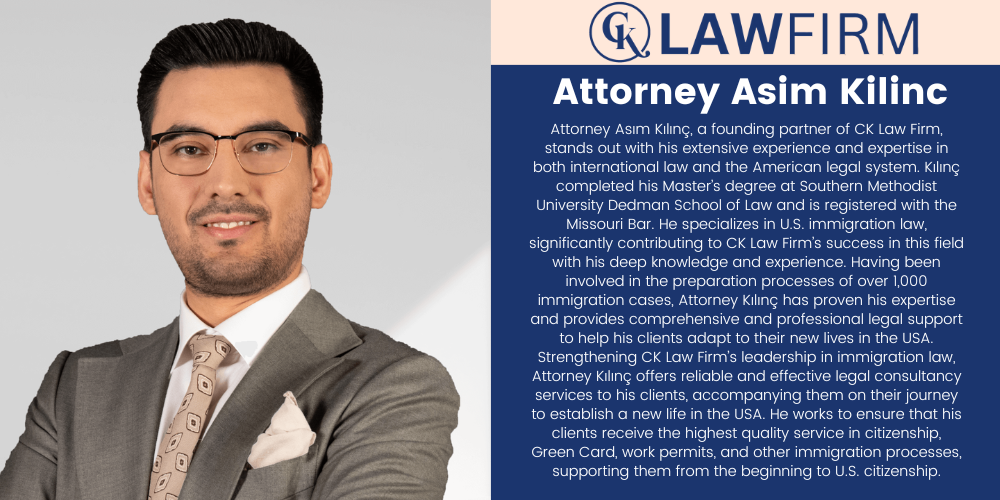
By Ergul Celiksoy, Immigration Attorney at CK Law Firm
The O-1 visa, known as the extraordinary ability visa offered by the United States, is typically preferred by professionals with unique talents but is also suitable for various occupational groups. To qualify, applicants must meet specific O-1 visa criteria by providing evidence of their exceptional abilities. With this visa, many professionals can elevate their careers to an international level and potentially transition to permanent residency in the U.S. In this article, I will cover key topics related to the application process and eligibility requirements.
- What Is the O-1 Visa?
- Which Professions Qualify for the O-1 Visa?
- What Are the Eligibility Requirements for the O-1 Visa?
- Application Process for the Extraordinary Ability Visa
- Benefits and Opportunities for O-1 Visa Holders
Along with the topics listed above, I will also highlight key points you should pay attention to during the application process. If you have any further questions beyond the subjects covered here, feel free to leave a comment on this blog or contact us via our website. Additionally, for inquiries on other topics, you can reach out to me directly on LinkedIn.
What Is the O-1 Visa?
The O 1 visa is a U.S. visa category designed for individuals with extraordinary abilities in their field. Applicants must provide strong evidence demonstrating that they have achieved significant recognition or distinction in their area of expertise. Additionally, the O-1 visa is divided into two separate categories, allowing professionals from various industries to apply based on their specific qualifications.
- O-1A Visa: This category covers experts with extraordinary abilities in science, education, business, or athletics, who can prove their achievements through awards or other forms of recognition.
- O-1B Visa: Suitable for individuals distinguished in the fields of arts or media, the O-1B visa requires applicants to provide evidence of their talents, similar to the O-1A visa. Awards or other notable achievements must be presented as part of the application. The O-1B visa is also widely known as the O-1 artist visa.
O-2 and O-3 Visas: These visas are considered part of the O-1 visa category and are designed for individuals accompanying an O-1 visa holder. For example:
- O-2 Visa: This visa is intended for individuals who will assist or accompany the O-1 visa holder in their work or performance.
- O-3 Visa: This visa is designed for family members of the O-1 visa holder, including their spouse and children under the age of 21.
Which Professions Qualify for the O-1 Visa?
In January 2025, the U.S. Citizenship and Immigration Services (USCIS) released new guidelines and criteria regarding O-1 visa occupations. These updates broaden the answer to the question “Who is eligible for an O-1 visa?” and make the application process more flexible and clearer, especially for individuals working in emerging fields. Below are the occupational groups more explicitly defined in this update:
- Experts in Critical and Emerging Technologies: Professionals working in fields such as artificial intelligence, biotechnology, and nanotechnology, as well as those contributing significant projects to these sectors.
- Startup Founders and Entrepreneurs: Individuals offering innovative solutions and making a difference in their fields, particularly those with projects in the technology and finance sectors. For more details, you can check out our article titled “O-1 Visa for Startup Founders in the U.S.”
- Science and Technology Professionals: Researchers, scientists, engineers, and academics who have made notable contributions in their areas.
- Art and Entertainment Industry Workers: This includes painters, actors, directors, writers, and designers.
- Athletes and Coaches: Professional athletes, coaches, and sports managers who have demonstrated excellence in their fields.
- Business Leaders: Executives and business professionals holding leadership positions in their industries.

What Are the Eligibility Requirements for the O-1 Visa?
USCIS expanded the types of evidence considered for O-1 visa applications in the January 2025 guidelines. This update particularly benefits experts working in emerging technologies. The specific O-1 visa criteria for professionals in these fields are as follows:
- Applying Through One’s Own Company: Applicants can now use their own company as a separate legal entity to file the petition on their behalf. For example, a startup or limited liability company (LLC) established in the U.S. can act as a legal entity and sponsor the applicant by submitting the required petition.
- Providing Evidence in Emerging Technologies: Professionals working in emerging technologies must provide documentation that demonstrates their contributions and achievements in the field. This includes presenting evidence such as projects, patents, academic publications, or other documents showcasing the applicant’s impact in the sector.
- Flexibility in Job Changes: The new guidelines offer flexibility for professionals frequently changing roles within the technology sector. Applicants can continue using their existing O-1 visa even when they receive new job offers, provided they meet the required conditions.
- Recognition in the Field: Applicants need to demonstrate their recognition and distinction in their field of expertise. They can support this by providing evidence such as national or international awards. Industry achievements, media coverage, or other documentation of professional success can also be included.
Application Process for the Extraordinary Ability Visa
The U.S. O-1 visa application process, following the January 2025 updates, generally involves the following O-1 visa requirements:
- Application Through a Sponsor or Employer: The applicant’s own company can serve as a legal entity. It can submit the petition on behalf of the applicant.
- Preparing the Required Documents: Collect awards, certifications, publications, and other evidence that demonstrate the applicant’s extraordinary abilities.
- Contract or Agreement: A job contract between the applicant and the sponsoring employer must be provided.
- Submission of Form I-129: The applicant or sponsor must complete and submit Form I-129 to U.S. Citizenship and Immigration Services (USCIS).
- Approval Process: USCIS reviews the application, and if deemed eligible, grants approval.
Although the application process may seem complex, it becomes manageable with accurate and complete documentation. The key is ensuring that your documents are correct and complete before submission. Feel free to contact us for assistance at any stage of the process.
Benefits and Opportunities for O-1 Visa Holders
The O-1 visa is one of the key pathways to working in the United States. It allows recipients to elevate their work from a national level to an international scale. This helps facilitate career growth and increases recognition. However, the advantages of obtaining an O-1 visa go beyond just international career opportunities.
In fact, meeting the O-1 visa qualification criteria opens a route to apply for a Green Card. As widely known, a Green Card provides the right to live and work in the U.S. permanently. Under these conditions, many professionals can make their lives in the U.S. permanent. If you have further questions or need clarification on any aspect of this topic, feel free to reach out to us through our website. Additionally, you can contact me directly on LinkedIn for personalized communication.
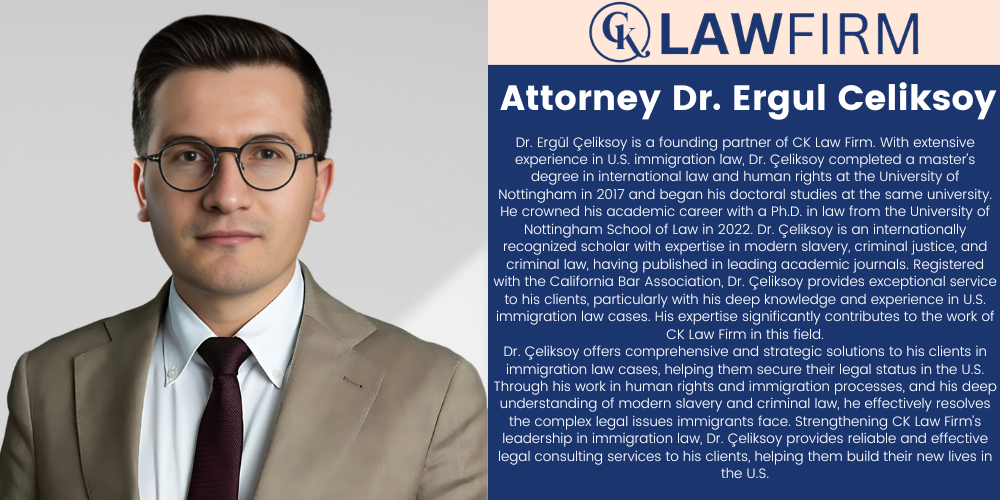
CK Law Firm content editor Özlem Kara sat down with Ergül Çeliksoy, a founding partner of CK Law Firm and an expert in E-2 Investor Visa, to address the most frequently asked questions on Ekşi Sözlük regarding E-2 Investor Visa. We thank Ergül Çeliksoy for this insightful and enjoyable interview.
By reading this blog, you will find answers to the following questions:
- What is the E-2 Investor Visa?
- Who Can Apply for the E-2 Investor Visa?
- What Documents Are Required for the E-2 Visa?
- Requirements for the E-2 Visa
- E-2 Visa Application Process
What is the E-2 Investor Visa?
The E-2 Investor Visa allows citizens of treaty countries to establish or purchase a business in the United States by making a significant investment. This visa enables investors to live in the U.S. and manage their businesses.
The E-2 visa also allows family members (spouse and children under 21) to reside in the United States. However, it is not an immigrant visa, meaning it does not directly lead to a Green Card. The visa duration can be extended based on the continuity and success of the business.
Who Can Apply for the E-2 Investor Visa?
Individuals who meet the following criteria can apply for the E-2 Investor Visa:
- Must be a citizen of a country that has an E-2 visa treaty with the United States.
- Must invest a significant amount of capital in a U.S. business.
- The investor must actively manage and control the business operations.
- The investment must carry commercial risk and contribute to the U.S. economy.
- The investment source must be legal, and the business must be operational.
What Documents Are Required for the E-2 Visa?
To apply for the E-2 Visa, the following documents must be carefully prepared:
- Passport
- DS-160 Application Form
- Photo
- E-2 Business Plan
- Proof of Investment
- Business-Related Documents
- Employee Documentation
- Previous Business Experience Records
- Intent to Return Documentation
Requirements for the E-2 Visa
- Qualified Investor Status
The applicant must be a national of a country that has a treaty of commerce with the United States. - Significant Capital Investment
The investment must be substantial and sufficient to make the business operational and sustainable. The investment must be at risk and actively used in business operations. - Active Business Management
The investor must actively manage the business operations. Passive investments do not qualify for the E-2 visa. - Genuine and Commercially Viable Investment
The business must be a real, active, and operating enterprise that generates income and contributes to the U.S. economy. - Business Sustainability and Plan
The investment must create employment opportunities for U.S. citizens or Green Card holders. A detailed business plan is essential to demonstrate the business’s long-term viability. - Irrevocable Investment
The investment must not be speculative and must be subject to financial risk. - Temporary Stay
The E-2 visa is a non-immigrant visa, but it can be renewed as long as the business remains operational. - Family Members
Spouses and children under 21 of the E-2 visa holder can accompany the investor. Spouses can work, and children can attend school.
E-2 Visa Application Process
- Preparing the Business Plan
A comprehensive business plan must be created to outline the investment details, business operations, and sustainability. - Compiling the Required Documents
All necessary documents, including financial details, proof of investment, and active management involvement, must be prepared meticulously. - Consular Interview
Applicants must attend an interview at the U.S. Consulate to explain their business plan and investment. - Visa Approval and Entry to the U.S.
Once approved, the investor can enter the U.S. to start or take over the business.
Closing Notes from Ergül Çeliksoy
The E-2 visa offers a unique opportunity for investors who wish to establish or manage businesses in the U.S. However, thorough preparation, a solid business plan, and active business involvement are essential for success. For questions regarding E-2 eligibility and documentation, you can visit cklawfirm.org, email us at info@cklawfirm.org, or reach me directly on LinkedIn.
Asım Kılınç, Immigration Attorney, CK Law Firm
Various visa options are available for startup founders and entrepreneurs to work in the United States. In this article, we will discuss how startup founders can apply for the U.S. O-1 visa while providing an overview of the O-1 visa itself. Below are the key topics we will cover in this post:
- Why Should Startup Founders Prefer the O-1 Visa?
- What Should You Consider When Applying for an O-1 Visa as a Startup Founder?
- What Are the Benefits of Applying for an O-1 Visa for Entrepreneurs?
- How Long Is the O-1 Visa Valid? How Many Years Can I Stay in the U.S.?
We frequently hear these questions from the clients we advise, and I will share the answers with you in the following sections of this article. However, if you have additional questions or if there’s anything unclear, please don’t hesitate to reach out. You can always contact us through the comment section of this blog or via the official CK Law Firm website. Additionally, feel free to connect with me directly on LinkedIn for personalized communication. Happy reading!
Why Should Startup Founders Prefer the O-1 Visa?
The O-1 visa is suitable not only for individuals with extraordinary abilities who receive a job offer but also for those establishing a startup in the U.S. With an O-1 visa, you can obtain a personal visa and start working for your own startup. However, it’s important to note that you cannot self-sponsor your O-1 visa application. Instead, the legal entity of your startup can act as your sponsor.
Proving Your Employment in Your Own Startup
Another important point to keep in mind is that you must prove you are an employee of your own startup or venture. This may require relinquishing certain authorities to demonstrate your employee status within the company. To clarify, it means that one or more individuals must have specific authority over you, such as the ability to hire, pay your salary, or terminate your employment if necessary.
No Previous Establishment Requirement for Startups
One of the biggest advantages of obtaining an O-1 visa for entrepreneurs and startup founders in the U.S. is that there is no requirement for the company to have been established in another country. In other words, you can apply for an O-1 visa and legally start working by founding a startup solely in the U.S. Moreover, there is no minimum annual revenue requirement during this process. It is sufficient for your startup to contribute economic or innovative value to the country.
Duration and Extension of the O-1 Visa
Another significant advantage of the O-1 visa is that it grants you the right to live and work in the U.S. for up to three years without restrictions. At the end of this period, you can extend your visa, provided you meet the necessary conditions. Additionally, the O-1 visa offers the opportunity to apply for a Green Card, allowing you to live and work permanently in the U.S.
Another important advantage of the O-1 visa is that it allows you to live and work in the U.S. for up to three years without any limitations. At the end of this period, you can extend your visa as long as you meet the necessary requirements. Moreover, the O-1 visa provides the opportunity to apply for a Green Card, giving you the chance to live and work permanently in the U.S.
These flexible conditions make the O-1 visa an attractive option for many foreign investors and startup founders aiming to pursue entrepreneurship in the U.S.
What Should You Consider When Applying for an O-1 Visa as a Startup Founder?
As an entrepreneur or startup founder, there are several critical steps you should consider before applying for an O-1 visa. These steps can be summarized as follows:
- Company Formation: Establish your company in the U.S. at least three months before applying to strengthen your visa application.
- Employer Identification Number (EIN): The EIN is a tax ID issued by the IRS, required for taxes, hiring, and financial transactions. Without it, you cannot open a U.S. bank account or hire employees. O-1 visa applicants must have an EIN.
- Company Documents: Submit your company’s formation documents (e.g., Articles of Incorporation) to prove official status. These must be approved by the state.
- Open a U.S. Bank Account: A U.S. bank account shows your business operates legally. Provide the EIN and formation documents when opening the account.
- Business License: Depending on your industry, you may need a license. Some states require it for certain services.
- Website and Brochure: Create a professional website and brochure to help immigration officers understand your business.
- Mailing Address: Have a mailing address for USCIS correspondence. A commercial address is preferable over a residential one.
- Office Address: An O-1 petition requires a work location. Use an actual office address, not a virtual or residential one.
- Prove Operations: Provide evidence of active operations, such as fundraising documents, contracts, or media coverage.
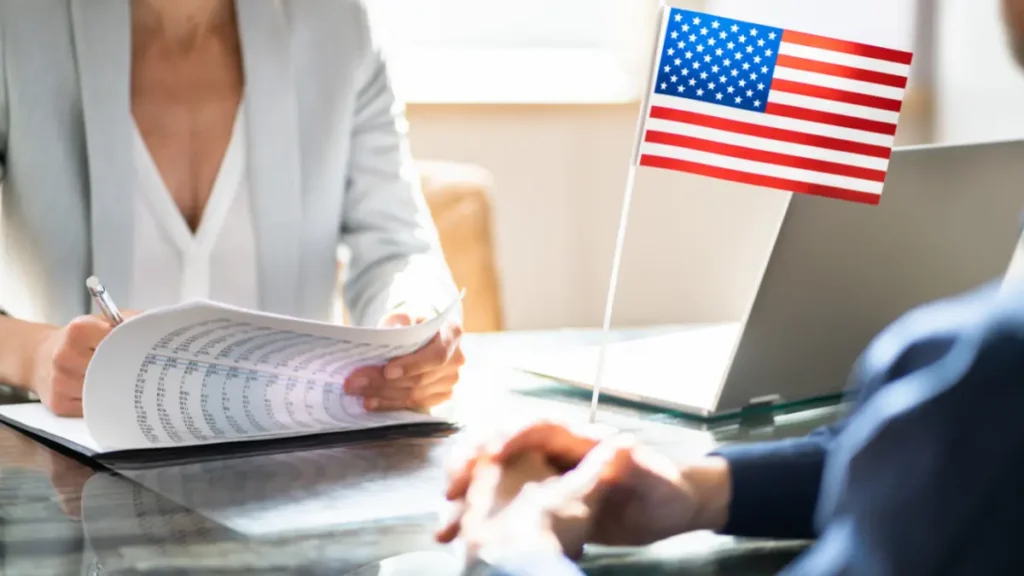
What Are the Benefits of Applying for an O-1 Visa for Entrepreneurs?
There is no specific time restriction for applying for a U.S. O-1 visa. This flexibility allows you to submit your application at any time once you have prepared the necessary documents. While applications are typically processed within 2 to 3 months, those who wish to expedite the process can use the Premium Processing Service, which reduces the evaluation time to as little as 15 days.
One of the key advantages of the O-1 visa is that it can be extended without any time limitation. Initially granted for a period of 3 years, the O-1 visa can be renewed indefinitely, provided valid justifications are presented. Additionally, O-1 visa holders may apply for a Green Card through the EB-1A visa if they meet certain conditions, allowing them to obtain permanent residency in the U.S.
Another important advantage of the O-1 visa is that it has no quota restrictions. This allows entrepreneurs and startup founders to apply for the visa at any time without being affected by a limited application cap. The flexible nature of the O-1 visa provides a significant opportunity for foreign entrepreneurs who wish to establish businesses and develop long-term projects in the U.S.
How Long Is the O-1 Visa Valid? How Many Years Can I Stay in the U.S.?
The O-1 visa is initially granted with a maximum validity period of 3 years. This duration is determined based on the visa holder’s project or employment contract in the U.S. For example, if you apply for an O-1 visa as an entrepreneur for a specific business project, the visa may be approved for less than 3 years, depending on the project’s timeline. However, after the initial 3-year period, visa holders can request annual extensions by providing valid reasons and demonstrating that their activities in the U.S. are ongoing. There is no limit to the number of extensions, but each extension request must be supported by documentation proving the continuation of the project.
The O-1 visa, with its flexible duration and unlimited extension options, is an attractive choice for entrepreneurs aiming to execute long-term projects in the U.S. Moreover, O-1 visa holders who meet certain criteria can apply for a Green Card through the EB-1A visa, allowing them to obtain permanent residency in the U.S. This feature makes the O-1 visa not just a short-term solution but an integral part of long-term immigration plans.
Therefore, if you are looking to open the door to working and living in the U.S., feel free to seek assistance through our website. You can also reach out to me directly via LinkedIn.

By Asim Kilinc, Immigration Attorney at CK Law Firm
Embarking on the immigration journey to the United States can be both exciting and overwhelming. However, the complexity of immigration laws and procedures often leads to common mistakes that can delay or derail your application. Through the experiences of fictional characters like Maria, a hopeful immigrant from Brazil, and Ahmed, an engineer from Egypt, this blog will highlight frequent immigration errors and provide actionable tips on how to avoid them.
1. Incomplete or Incorrect Application Forms
Maria’s Story: Maria dreamed of reuniting with her husband in the U.S. She diligently filled out her visa application but missed a critical section about her previous travel history. This oversight led to delays and additional requests for information.
Tip: Carefully review your application forms multiple times to ensure all sections are completed accurately. If you’re unsure about any part, seek assistance from an immigration attorney or a reputable immigration service provider.
2. Missing Deadlines
Ahmed’s Story: Ahmed, a skilled engineer, secured a job offer from a U.S. company. However, he missed the deadline to file his H-1B visa petition due to a misunderstanding of the application timeline. This mistake forced him to wait another year to reapply.
Tip: Keep track of all deadlines associated with your visa application. Create a timeline and set reminders for important dates. Consulting with an immigration lawyer can help you stay on top of deadlines and avoid costly delays.
3. Providing Inconsistent Information
Maria’s Story Continues: During her interview, Maria inadvertently provided a different date for her marriage than what was on her application. This inconsistency raised red flags, resulting in further scrutiny and delays.
Tip: Ensure consistency in all information provided across various forms and documents. Keep a personal record of all dates and details submitted to avoid discrepancies during interviews or follow-up inquiries.
4. Not Preparing for the Interview
Ahmed’s Story Continues: Ahmed was excited about his visa interview but underestimated its importance. He didn’t prepare thoroughly and struggled to answer questions about his employment and qualifications, leading to a denial.
Tip: Treat your visa interview seriously. Practice common questions, gather all necessary documents, and dress professionally. Familiarize yourself with your application details to confidently discuss them during the interview.
5. Ignoring Legal Advice
Maria’s Story Continues: Maria was advised by her friend to omit certain details about her prior visa refusal, thinking it would improve her chances. This advice backfired, resulting in a denial due to misrepresentation.
Tip: Always seek advice from qualified immigration attorneys rather than relying on friends or unverified sources. Honest and transparent communication with immigration officials is crucial for a successful application.
6. Not Maintaining Legal Status
Ahmed’s Story Concludes: After arriving in the U.S., Ahmed neglected to maintain his visa status by failing to renew it on time. This lapse resulted in legal complications and jeopardized his stay.
Tip: Always be aware of the conditions and expiration dates of your visa. Take proactive steps to renew or adjust your status well before it expires. Consult with an immigration attorney if you face any uncertainties.
7. Overlooking Financial Requirements
Maria’s Story Concludes: Maria didn’t realize that she needed to provide proof of financial support for her family-based visa application. This omission led to delays and additional paperwork.
Tip: Ensure you meet all financial requirements for your visa category. Gather necessary documents such as affidavits of support, bank statements, and employment verification to demonstrate your financial stability.
8. Misunderstanding Eligibility Criteria
Ahmed’s Story Ends: Ahmed mistakenly believed he qualified for a visa category based on incorrect advice from an online forum. His application was denied, costing him time and money.
Tip: Thoroughly research the eligibility criteria for the visa category you are applying for. Use official resources like the USCIS website or consult with an immigration attorney to verify your eligibility before applying.
Conclusion
The immigration process is fraught with potential pitfalls, but with careful preparation and the right guidance, these common mistakes can be avoided. By learning from the experiences of Maria and Ahmed, you can better navigate your own immigration journey. CK Law Firm is here to assist you every step of the way. Contact us today for expert advice and support tailored to your unique situation.
By Ergul Celiksoy, Immigration Attorney at CK Law Firm
Preparing for your immigration interview is a crucial step in the immigration process. Whether you’re applying for a visa, green card, or citizenship, the interview can determine the success of your application. Drawing on years of experience as an immigration attorney, I’ve seen firsthand how proper preparation can make a significant difference. This detailed guide will provide you with essential tips, advice, and examples from actual interviews to help you succeed.
Understanding the Importance of the Immigration Interview
The immigration interview is designed to verify the information you’ve provided in your application and assess your eligibility. It’s a formal process where the interviewer will ask questions related to your application, background, and intentions in the U.S. Failing to prepare adequately can lead to misunderstandings, delays, or even denials.
General Preparation Tips
1. Review Your Application Thoroughly
- Example: I had a client, Sofia, who applied for a family-based green card. Before her interview, we reviewed her entire application together. This helped her recall details about her marriage, financial status, and travel history, ensuring consistency in her answers.
2. Gather and Organize Your Documents
- Checklist:
- Passport and visa
- Birth certificates
- Marriage certificates (if applicable)
- Employment letters
- Financial documents (bank statements, tax returns)
- Application forms and receipts
- Any correspondence from USCIS or the consulate
3. Understand the Interview Format
- Example: Ahmed, another client, was applying for citizenship. I explained that his interview would include questions about his background, his knowledge of U.S. history and government, and his English proficiency. Knowing what to expect helped him feel more confident.
4. Practice Common Questions
- Typical Questions:
- Why do you want to move to the U.S.?
- Can you tell me about your employment history?
- How did you meet your spouse? (for marriage-based applications)
- Have you ever been involved in any criminal activity?
- Do you plan to return to your home country?
5. Dress Appropriately
- Dress in professional, conservative attire to show respect for the process and the interviewer.
Specific Interview Scenarios
1. Family-Based Immigration Interviews
- Scenario: Maria was applying for a green card through her U.S. citizen spouse. During the interview, the officer asked about their relationship history, how they met, and their daily routines.
- Preparation Tip: Couples should discuss their relationship details and be prepared to answer personal questions. Bringing photo albums and joint financial documents can also help substantiate the relationship.
2. Employment-Based Immigration Interviews
- Scenario: John was applying for an H-1B visa. The officer questioned his job duties, qualifications, and the sponsoring company’s details.
- Preparation Tip: Review your job description, qualifications, and the company’s background. Ensure that all provided documents, such as employment contracts and letters, are accurate and up-to-date.
3. Naturalization (Citizenship) Interviews
- Scenario: Fatima was nervous about the civics test portion of her naturalization interview. We practiced U.S. history and government questions together, and she studied the official USCIS materials.
- Preparation Tip: Study the 100 civics questions provided by USCIS. Practice reading, writing, and speaking English to prepare for the language portion of the test.
Best Practices for the Day of the Interview
1. Arrive Early
- Plan to arrive at least 30 minutes before your scheduled interview time to account for security checks and any unforeseen delays.
2. Stay Calm and Composed
- Take deep breaths and stay calm. Answer questions honestly and clearly. If you don’t understand a question, it’s okay to ask the officer to repeat or clarify it.
3. Be Honest
- Honesty is crucial. Providing false information can lead to denial and even future immigration issues. If you don’t know the answer to a question, it’s better to say so than to guess or provide inaccurate information.
4. Bring a Translator if Necessary
- If you’re not fluent in English, you can bring a translator. Ensure the translator is certified and familiar with your case.
Post-Interview Tips
1. Follow Up
- After the interview, you may receive a notice with additional requests for evidence or a decision. Respond promptly to any requests to avoid delays.
2. Stay Informed
- Keep track of your case status online using the USCIS or consulate’s case tracking tools. Regularly check for updates and notifications.
3. Consult Your Attorney
- If you have any concerns or receive additional requests for information, consult with your immigration attorney immediately. They can provide guidance on the next steps and help address any issues that arise.
Conclusion
Preparing for your immigration interview is a critical step toward achieving your immigration goals. By thoroughly reviewing your application, practicing common questions, and understanding the interview process, you can approach your interview with confidence. At CK Law Firm, we are dedicated to guiding you through every step of the immigration process. Contact us today for expert legal advice and personalized support.
Subscribe to Our Newsletter
Subscribe to our newsletter to stay informed about the latest announcements and articles written by our attorneys on U.S. immigration processes.
Sobre Nosotros
Contáctanos
+1 (945) 527- 23 22
Correo electrónico
info@cklawfirm.org
Dirección
2800 Regal Rd #102, Plano, TX 75075

All Rights Reserved by CK Law Firm.


